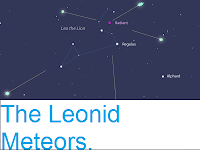The Quadrantid Meteor Shower is one of the brightest meteor showers of
the year, often producing over 100 meteors per hour at its peak, which
falls on the night of 3-4 January each year, and is predicted to peak before dawn on Wednesday 4 January 2015; as this is only a few days after the new moon, which falls on Thursday 29 December 2016, visibility for the shower should be very good.. The meteor shower originates in
the constellation of Boötes, high in the northern sky, which is slightly confusing, as most meteor
showers are named for the constellation in which they originate. This
is because the constellation was named in the sixteenth century by
astronomer Tycho Brahe, before the introduction of standardised
constellations used by modern astronomers, though to make matters a
little more confusing, Brahe didn't name the meteors this way either;
the name comes from the constellation of Quadrans Muralis, introduced by
Joseph Jérôme Lefrançois de Lalande in 1795, and dropped by the
International Astronomical Union in 1922. Because Boötes is visible only from the Northern Hemisphere, the Quadrantid Meteor Shower is not visible from the Southern Hemisphere, and is best viewed from northerly locations such as Canada or Scandinavia.
The radiant point of the Quadrantid Meteors (i.e. the point from which the meteors seem to radiate) at about 1.00 am on 4 January 2017. Meteor Showers Online.
The Quadrantid Meteors are unusual in
that they typically are only visible for a few hours either side of this
peak, whereas other showers are typically visible for days or even
weeks. This is thought to be because they originate from an asteroid
(196256) 2003 EH1, rather than the tail of a comet as with most meteor
showers. The orbit of this asteroid is tilted at an angle of 71.9° to
the plane of the Solar System, so that the Earth only very briefly
passes through the debris trail left by it, rather than remaining in it
for some time, as is the case with the trail of a comet with an orbit in
roughly the same plane as the Earth.
See also...
Follow Sciency Thoughts on Facebook.







